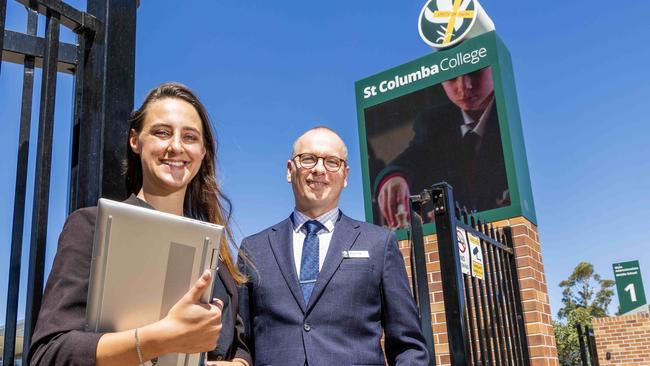Teachers at St Columba College work from home one day per term in new trial to prevent burnout
An SA school is trialling a work-from-home arrangement in hopes of improving the wellbeing of teachers.

SA News
Don't miss out on the headlines from SA News. Followed categories will be added to My News.
Teachers at an Adelaide Catholic and Anglican school have started working from home in a South Australian-first trial to decrease burnout rates.
Staff at St Columba College, in Andrews Farm, stayed home on Friday to catch up on admin tasks and “re-energise” as part of a trial initiative, principal Darren Pitt said.
“We want to help them create work/life balance,” he said.
“We understand that staff wellbeing is critical and we want high staff retention.”
Teachers will work from home one day in the middle of each of the four school terms in 2025.
The work from home days will be scheduled when St Columba has pupil-free days.
“We have very hardworking staff and we recognise the best outcomes for students are contingent on our staff being at their best,” Mr Pitt said.
“We’re aware teachers and education support officers have an increased amount of admin.”
Leadership at the college reallocated some of the staff professional learning days in the school year to accommodate work from home arrangements “so they could give their full attention to the students”.
“We don’t know of any other school that’s doing it and it’s going to improve outcomes for students” Mr Pitt said.

Other schools have “been really interested to hear (how the trial goes)” and principals have told Mr Pitt they may explore “something similar”.
The decision was inspired by “research and findings from Europe about four day working weeks”, he said.
Following spending Friday at home, staff reported saving time with uninterrupted work on tasks such as assessment reporting and lesson planning.
“The feedback we got was really positive and staff felt there was some serious time saving not having to drive to work and they were more focused,” Mr Pitt said.
St Columba College science and English teacher Paolina Rosa, who came from South Africa to teach at the school a year ago, said working from home was “absolutely phenomenal”.
“We did have time to work on actual work; marking, assessment creating but it (also) gave us time to improve our general sense of wellbeing,” the year 8 to 12 teacher said.
“The quality of time we get to spend with our students is so much better.”
During the day she made time to catch up with her friends for lunch and organise a nail appointment.
In particular, Ms Rosa, from Largs North, said she saved up to 45 minutes in travel time to and from school.
“When you’re working from home you don’t have those interruptions,” she said.
Ms Rosa was also able to communicate with students via email to provide individual feedback.
Mr Pitt did not rule out adding more work from home days for his staff but would “not increase non-contact time for students”.
“Whatever is the best outcome we would be open to considering,” he said.
The trial will continue throughout 2025 and may become permanent depending on the feedback from teachers.




